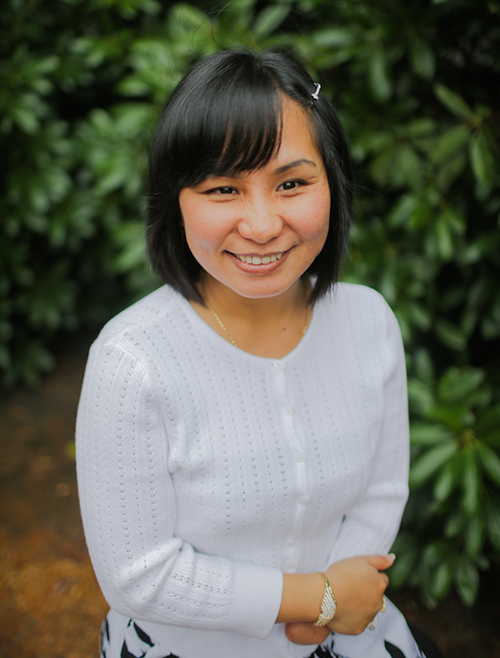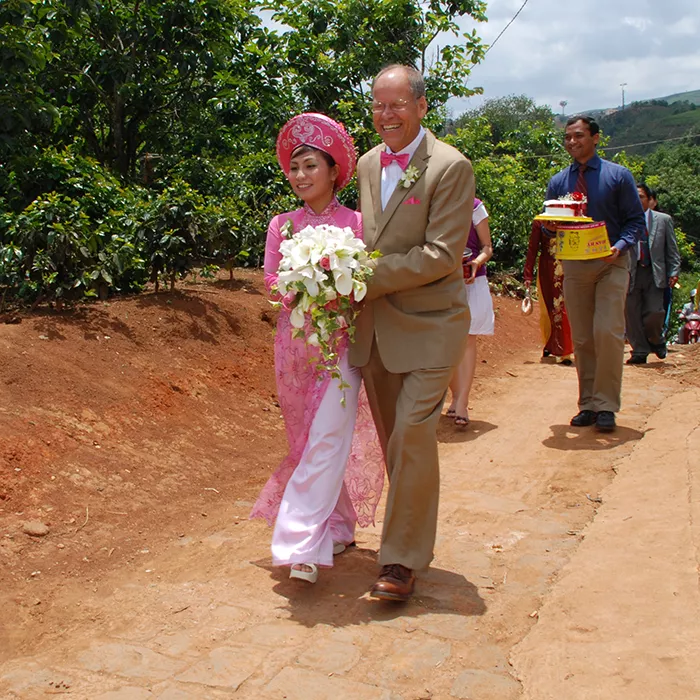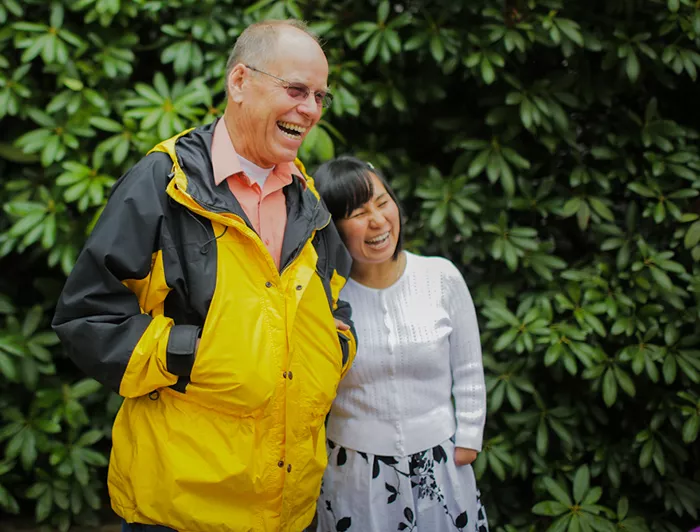Tran Thi Minh Tuyet (Snow) was in the second semester of an English linguistics degree in Vietnam when her professor sat her down with a suggestion: Transfer to another major.
Snow was a good student in the top half of her class and a scholarship recipient to boot. But her professor’s request wasn’t a complete surprise: Snow was one of only two blind students in the English program. If she switched to history, she could take oral exams. Wouldn’t that be easier?
By then, Snow had already met plenty of people who couldn’t see the path before her.
“I don’t know how I will deal with all the problems, because I’m not able to imagine any of them right now,” she had told university administrators who’d doubted her even after she had passed the university entrance exam.
She told her professor she would finish her English degree, no matter how long it took.
Snow had dreamed of going to college since she was a little girl living with her parents and little brothers on her family’s farm near the picturesque city of Dalat in the Central Highlands of Vietnam.
When Snow was in the third grade her father, Tran Van Nhy, found his daughter a desk. It had collected dust for years in a surplus warehouse with other leftovers from the U.S. military, but it was just the right size for a 7-year-old girl whose school smarts would take her far.
Sitting at her desk for the first time, Snow got to work cleaning it up. She felt underneath, getting into the little crevices with her tiny fingers.
She found a skinny metal object; it was shaped like a short pencil, but made of metal like brass. She got to work on wiping away the grime so she could read the words on it.
The explosion destroyed her left hand and permanently injured her right hand. It also destroyed both of her eyes.
She called to her parents, who were tending the family’s coffee fields. Later in the hospital, Snow was unconscious when a doctor suggested to her parents that it might be better to give the little girl a shot that would cause her to slip away and die. Her mother, Nguyen Duc Thi Hoa, gave the doctor such an earful, the family still talks about it.
Nhy and Hoa took their daughter home, where Hoa made poultices out of chopped-up turmeric to soothe her daughter’s scars and they both taught her how to navigate their house and nearby farm without her sense of sight. But when she was 9, it was time for her to continue her education; they sent her to live at the nearest school for the blind – in Ho Chi Minh City, an eight-hour bus ride away.
Back in the classroom, Snow was the same kid who loved school and loved where education could take her. A teacher there told her learning English was the key to communicating with people around the world – and would allow her to illustrate the capabilities of people who are blind.
But education for the blind in Vietnam usually ends at middle school. So Snow had to persuade skeptical high school administrators to let her in, even though the school had no Braille textbooks or other accommodations for students who are blind.
“I love learning – anything about learning,” Snow says. “If I don’t understand something, I have to do everything I can to understand.”
But she couldn’t do it alone and asked classmates for help. Soon, a regular network of friends would gather in a quiet park or church yard to study together. Friends read to Snow, and the discussions that followed helped deepen everyone’s understanding, she says
“Everyone has difficulties in life, so there’s no reason for me to pause, because I have to overcome them anyway,” Snow says. “So I do what it takes to get there. If I paused, imagining all the difficulties, I would fail.”
Soon after she graduated from college – on time – in 2003, a French insurance firm in Ho Chi Minh City gave Snow a shot at the telephone switchboard. Six years later, she was supervising six people in her own division selling auto, home and health insurance.
By then, Snow was also funding scholarships and mentoring college students who, like her, had to overcome some difficulties to earn their degrees. A family of teachers had funded her scholarship, and after Snow graduated, she persuaded others whose educations had been funded by the same family to mentor and support their own students.
Soon, more and more new graduates were paying it forward – some of Snow’s co-workers at the insurance company even joined in – until there were more than 2,000 students and graduates in the mentorship club meeting in huge social gatherings in Ho Chi Minh City.
She had the opportunity to sponsor blind students, but chose to sponsor sighted students instead. “I don’t want to be in a silo,” she says. “If I can sponsor a sighted person that will let other sighted people sponsor blind students. I thought that would be more impactful.”
Meanwhile, Snow continued to study English and posted a profile on a dating website to find native English speakers. She soon heard from Lee Jones, a Bellingham resident and retired building contractor who had learned to speak Vietnamese as an American G.I. during the Vietnam War.
Lee, a Jehovah’s Witness preparing to move to Vietnam for missionary work, wanted to talk to Snow about the Bible. Snow was much more interested in studying Lee’s accent than studying scripture, but they chatted online for several months before Lee came to Vietnam.
Lee said he was moved to tears seeing Snow smile the first time, knowing his friend had become such a warm, smart, funny, kind-hearted person in spite of so many challenges.
Soon, Lee and Snow spent hours together in the evenings after work, walking and talking for hours. Snow navigated the busy sidewalks with high heels and confidence, Lee at her side, and he accompanied her to and from work on the bus.
Snow introduced Lee to friends in the mentorship club she had helped start – immersing him in strong coffee, karaoke and fast, lively conversation.
Snow and Lee were falling in love and wanted to get married, so they traveled to see Snow’s parents back on their farm. Nhy and Hoa weren’t delighted, at first, about their daughter’s much-older American sweetheart.
“My mom and dad are really, really good parents,” Snow says. “In Vietnam, the Americans and French were really famous for getting divorced. They were worried about my happiness.”
Lee wooed Snow’s parents by continuing to study the Vietnamese language and helping out on the farm. Months later, when Nhy and Hoa finally agreed to sit down and talk with Lee about marrying Snow, it took several hours of Lee pleading, sweating – even shedding a few tears – before Snow’s parents gave their blessing.
Snow and Lee got married in March 2008 in her family’s house with dozens of family and friends in attendance. “She is so beautiful,” Lee said in Vietnamese when he first saw Snow as she wore an embroidered áo dài wedding dress and stood between her mother and father.
Photos of their wedding made national headlines in Vietnam. “If you happen to spot an American man and a blind, disabled Vietnamese woman walking happily together down Ho Chi Minh City’s streets, it may just be Donald Lee Jones and Tran Thi Minh Tuyet, a couple whose love has triumphed over geographical distances, language barriers and heart-breaking misfortune,” one story described them.
Snow and Lee lived in Ho Chi Minh City until 2010, when they moved to Bellingham so Snow could complete an MBA at Western.
“It’s been one of my dreams since I was 5, 6, 7 years old, that I would (attend) higher education in a foreign country, just to see how people have different ways of teaching and learning,” Snow says.
At Western, Lee walked the hallways of Parks Hall with Snow as he had the streets of Ho Chi Minh City. He let her know when friends were nearby so she could say hello, and made sure she got to her to group project meetings.
She used screen-reading software to read articles and some textbooks. “But textbooks aren’t written for blind people,” says Dan Purdy (’06, Business Administration – Marketing; ’07, MBA), former associate director of Western’s MBA program. “For instance, supply and demand curves. So much information is packed into that image.”
Sometimes, Snow says, she let her screen reader recite columns of figures, letting the numbers wash over her as she searched for patterns in the data. And while other students took visual cues from the text and skimmed for the basic information, Snow’s screen reader treats every word the same. So she read every single word.
“I’m not sure that’s an advantage or disadvantage,” she says. “I can do everything other people can do, just sometimes on three hours’ sleep.”
Each night, Snow and Lee reviewed the day’s classes with Lee filling in visual details from lectures.
“He tried to act as her eyes as much as he could,” remembers classmate Jasmin Baker-Kinney (’10, Psychology; ’14, MBA). “His life is Snow and I think that’s amazing. I don’t know anyone else who would do that. I honestly don’t know what they would do without each other.”
But when it came to class discussions, Snow spoke for herself, Baker-Kinney says. While classmates used note cards during presentations, Snow memorized elaborate PowerPoint slides to present to the class. Snow pulled her own weight in group projects, too, Baker-Kinney says.
“I couldn’t bring myself to slack off, even a little bit, in group work because I knew how hard she was working,” says Baker-Kinney, now a human resources executive with Volant Aerospace in Burlington. “I remember we were worried about her. We knew she didn’t get a lot of sleep because she had to work so hard.”
But Snow rarely cracked – her positive outlook rarely wavered, Baker-Kinney remembers.
“She’s a very happy person,” she says. “When I think of her, I think of the smile she always had on her face.”
Snow ended up getting nearly straight A’s in the MBA program and was named the group’s Outstanding Graduate in 2014.
Today, Snow and Lee are back in Ho Chi Minh City, where Snow is the Customer Experience project manager for AIG Vietnam – the human resources executive who interviewed her remembered reading about Lee and Snow in the newspaper – and leads the company’s customer service improvement efforts.
While Snow is at work during the day, Lee continues to study Vietnamese and the Bible, and runs errands for Snow’s family in Dalat. At night, Snow and Lee sometimes meander through the city’s food stalls and sit by the river to eat dinner. They’re also thinking about buying an apartment.
Snow loves her job at AIG, but is still hatching other plans. She would love to teach an online course through Western Extended Education about doing business in Southeast Asia. And she has long dreamed of launching a small business employing blind people – something that is both an economic opportunity and an example of what’s possible.
But Purdy hopes she’ll consider a career showing colleges and universities what’s possible when they make their courses more accessible to blind students. He wonders if it really should take Snow’s kind of steely persistence for a blind student to earn a graduate degree.
“My sense is, she’s taught us as much as we’ve taught her,” Purdy says. “She can help the system learn how to do it better.”


